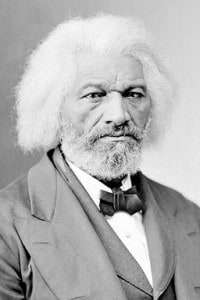The Volokh Conspiracy
Mostly law professors | Sometimes contrarian | Often libertarian | Always independent
Remembering Frederick Douglass

Google is celebrating Frederick Douglass today, which is the first day of Black History Month. Douglass is, of course, most famous for his work as an abolitionist, and for his inspiring autobiography, which recounts his escape from slavery and his subsequent career. But it is also worth remembering some of his lesser-known works. His defense of Chinese immigration, which I wrote about here, is particularly relevant today. In Douglass' day, Chinese immigration attracted many of the same sorts of xenophobic objections as does Hispanic immigration in our time:
I submit that this question of Chinese immigration should be settled upon higher principles than those of a cold and selfish expediency.
There are such things in the world as human rights. They rest upon no conventional foundation, but are external, universal, and indestructible. Among these, is the right of locomotion; the right of migration; the right which belongs to no particular race, but belongs alike to all and to all alike. It is the right you assert by staying here, and your fathers asserted by coming here. It is this great right that I assert for the Chinese and Japanese, and for all other varieties of men equally with yourselves, now and forever. I know of no rights of race superior to the rights of humanity, and when there is a supposed conflict between human and national rights, it is safe to go to the side of humanity….
Not the least among the arguments whose consideration should dispose to welcome among us the peoples of all countries, nationalities and color, is the fact that all races and varieties of men are improvable. This is the grand distinguishing attribute of humanity and separates man from all other animals….
The fact that the Chinese and other nations desire to come and do come, is a proof of their capacity for improvement and of their fitness to come…
Let the Chinaman come; he will help to augment the national wealth. He will help to develop our boundless resources; he will help to pay off our national debt. He will help to lighten the burden of national taxation.
Douglass' 1871 speech on how we should remember the Civil War dead is also underrated, and still has contemporary relevance at a time when the legacy of that conflict remains disputed, and there are controversies about such issues as whether state governments should continue to display the Confederate flag:
We are sometimes asked, in the name of patriotism, to forget the merits of this fearful struggle, and to remember with equal admiration those who struck at the nation's life and those who struck to save it, those who fought for slavery and those who fought for liberty and justice.
I am no minister of malice. I would not strike the fallen. I would not repel the repentant; but may my "right hand forget her cunning and my tongue cleave to the roof of my mouth," if I forget the difference between the parties to that terrible, protracted, and bloody conflict….
I offered some thoughts on Douglass' 1871 Civil War speech here.
At the Reason website, Nick Gillespie has an article summarizing why Douglass' legacy is is of particular importance for libertarians (though, obviously, not them alone).


Show Comments (0)